Comprehensive Essay on the Philosophical Concept of Knowledge
VerifiedAdded on 2020/04/07
|9
|2310
|244
Essay
AI Summary
This essay provides a comprehensive exploration of the philosophical concept of knowledge. It begins by defining knowledge and discussing its various sources, including perception, inference, testimony, and similarity. The essay then delves into the tripartite definition of knowledge (justified true belief) and examines its nuances, including the distinction between implicit and explicit knowledge, and also propositional knowledge. The essay further explores the Gettier problem, which challenges the sufficiency of the tripartite definition, and discusses counter-examples and alternative perspectives. It covers the concept of conceptual analysis in philosophy, outlining the process of defining and refining concepts. The essay also touches upon the role of sufficient and necessary conditions in philosophical arguments. Ultimately, the essay provides a detailed analysis of the complexities of defining and understanding knowledge from a philosophical standpoint, including the impact of inference, evidence, and beliefs. This essay is available on Desklib, a platform providing study resources for students.
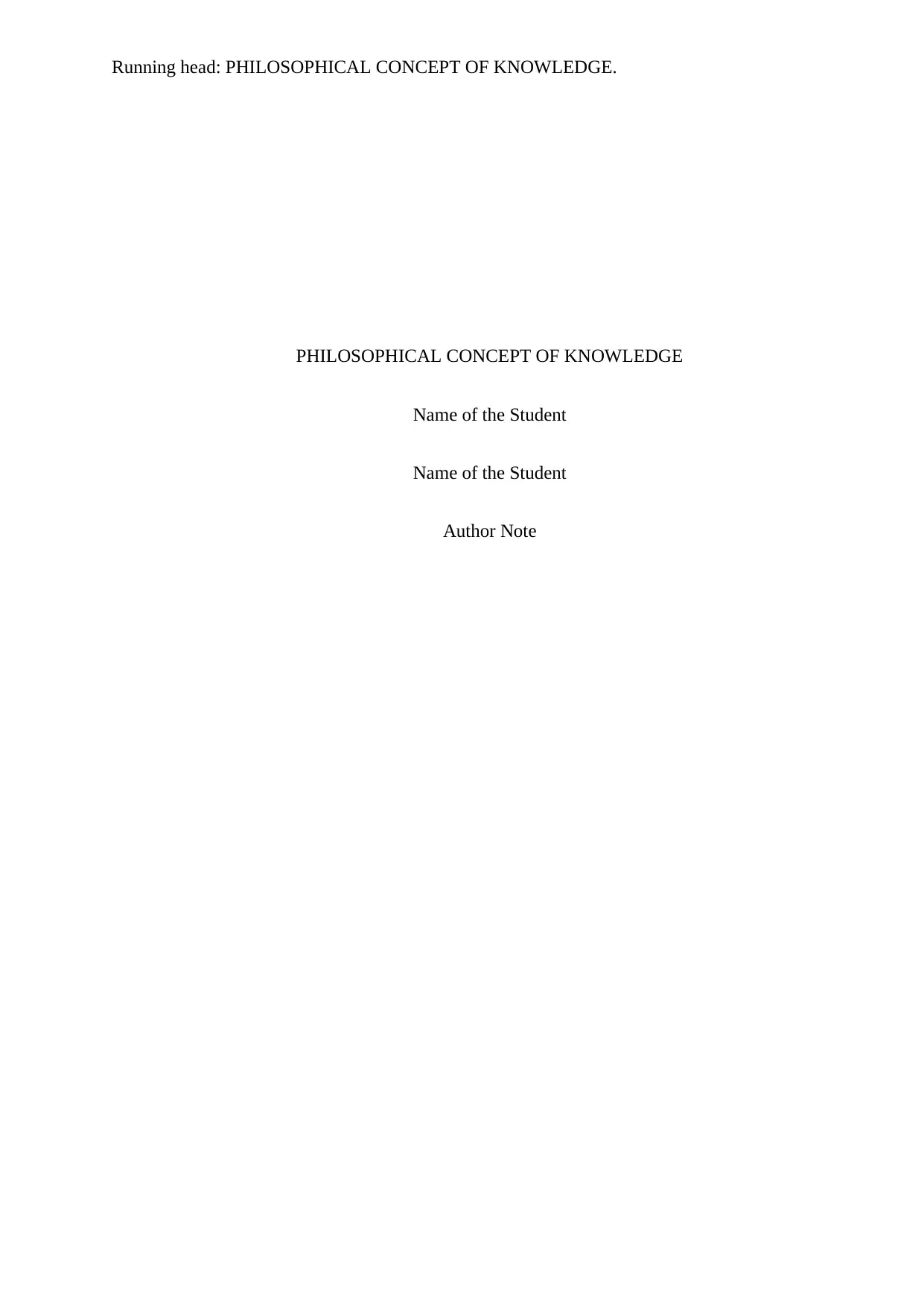
Running head: PHILOSOPHICAL CONCEPT OF KNOWLEDGE.
PHILOSOPHICAL CONCEPT OF KNOWLEDGE
Name of the Student
Name of the Student
Author Note
PHILOSOPHICAL CONCEPT OF KNOWLEDGE
Name of the Student
Name of the Student
Author Note
Paraphrase This Document
Need a fresh take? Get an instant paraphrase of this document with our AI Paraphraser
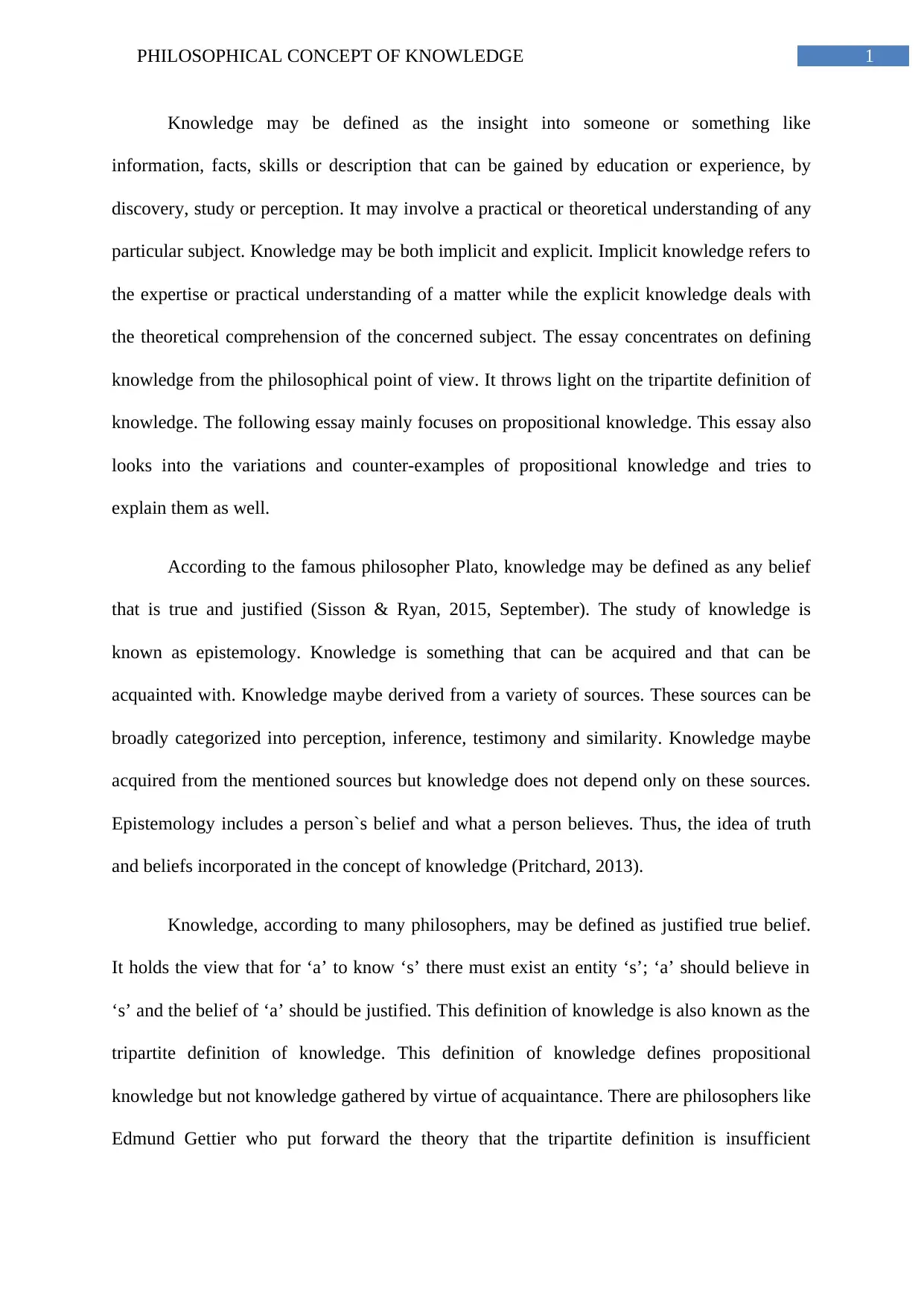
1PHILOSOPHICAL CONCEPT OF KNOWLEDGE
Knowledge may be defined as the insight into someone or something like
information, facts, skills or description that can be gained by education or experience, by
discovery, study or perception. It may involve a practical or theoretical understanding of any
particular subject. Knowledge may be both implicit and explicit. Implicit knowledge refers to
the expertise or practical understanding of a matter while the explicit knowledge deals with
the theoretical comprehension of the concerned subject. The essay concentrates on defining
knowledge from the philosophical point of view. It throws light on the tripartite definition of
knowledge. The following essay mainly focuses on propositional knowledge. This essay also
looks into the variations and counter-examples of propositional knowledge and tries to
explain them as well.
According to the famous philosopher Plato, knowledge may be defined as any belief
that is true and justified (Sisson & Ryan, 2015, September). The study of knowledge is
known as epistemology. Knowledge is something that can be acquired and that can be
acquainted with. Knowledge maybe derived from a variety of sources. These sources can be
broadly categorized into perception, inference, testimony and similarity. Knowledge maybe
acquired from the mentioned sources but knowledge does not depend only on these sources.
Epistemology includes a person`s belief and what a person believes. Thus, the idea of truth
and beliefs incorporated in the concept of knowledge (Pritchard, 2013).
Knowledge, according to many philosophers, may be defined as justified true belief.
It holds the view that for ‘a’ to know ‘s’ there must exist an entity ‘s’; ‘a’ should believe in
‘s’ and the belief of ‘a’ should be justified. This definition of knowledge is also known as the
tripartite definition of knowledge. This definition of knowledge defines propositional
knowledge but not knowledge gathered by virtue of acquaintance. There are philosophers like
Edmund Gettier who put forward the theory that the tripartite definition is insufficient
Knowledge may be defined as the insight into someone or something like
information, facts, skills or description that can be gained by education or experience, by
discovery, study or perception. It may involve a practical or theoretical understanding of any
particular subject. Knowledge may be both implicit and explicit. Implicit knowledge refers to
the expertise or practical understanding of a matter while the explicit knowledge deals with
the theoretical comprehension of the concerned subject. The essay concentrates on defining
knowledge from the philosophical point of view. It throws light on the tripartite definition of
knowledge. The following essay mainly focuses on propositional knowledge. This essay also
looks into the variations and counter-examples of propositional knowledge and tries to
explain them as well.
According to the famous philosopher Plato, knowledge may be defined as any belief
that is true and justified (Sisson & Ryan, 2015, September). The study of knowledge is
known as epistemology. Knowledge is something that can be acquired and that can be
acquainted with. Knowledge maybe derived from a variety of sources. These sources can be
broadly categorized into perception, inference, testimony and similarity. Knowledge maybe
acquired from the mentioned sources but knowledge does not depend only on these sources.
Epistemology includes a person`s belief and what a person believes. Thus, the idea of truth
and beliefs incorporated in the concept of knowledge (Pritchard, 2013).
Knowledge, according to many philosophers, may be defined as justified true belief.
It holds the view that for ‘a’ to know ‘s’ there must exist an entity ‘s’; ‘a’ should believe in
‘s’ and the belief of ‘a’ should be justified. This definition of knowledge is also known as the
tripartite definition of knowledge. This definition of knowledge defines propositional
knowledge but not knowledge gathered by virtue of acquaintance. There are philosophers like
Edmund Gettier who put forward the theory that the tripartite definition is insufficient
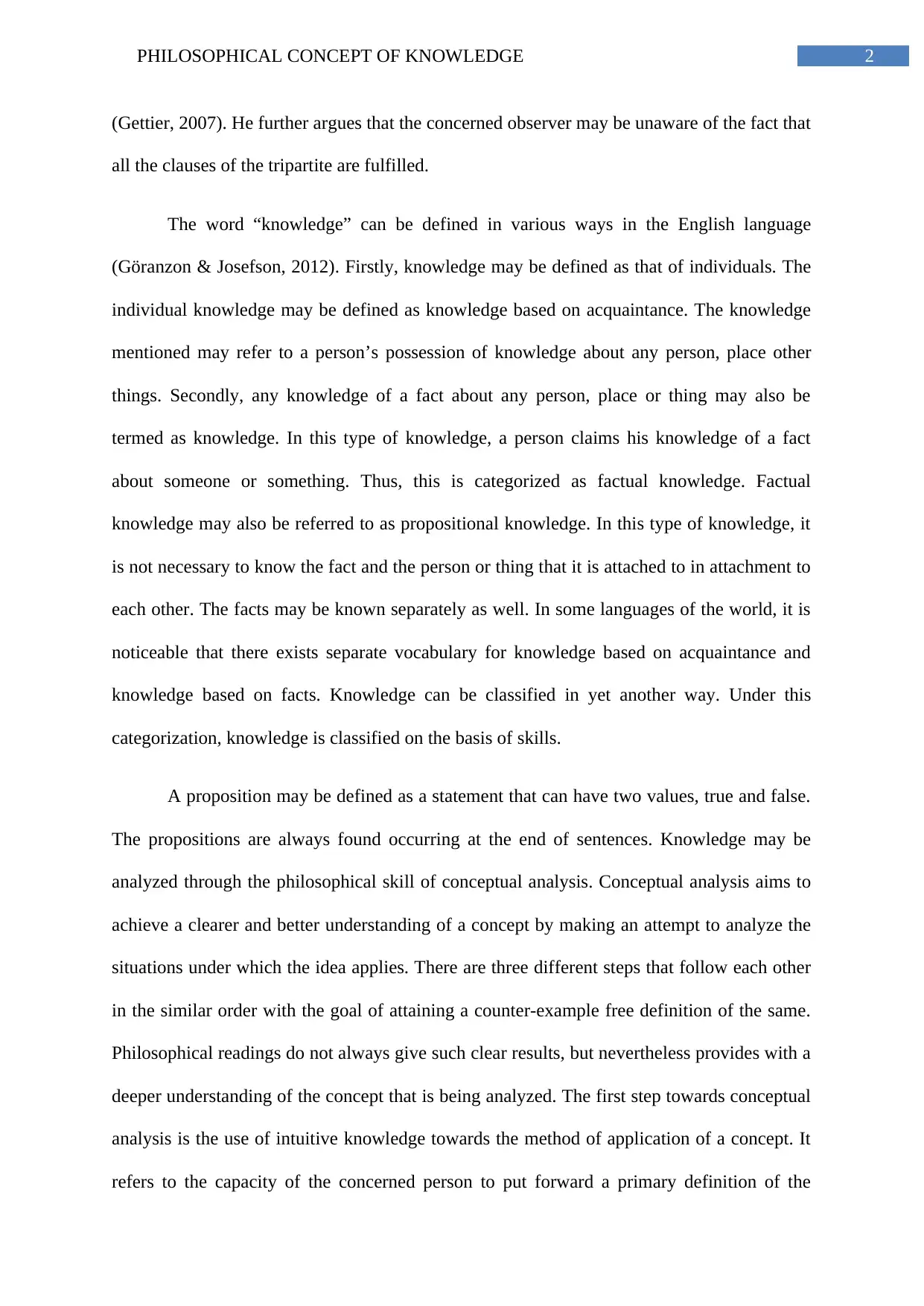
2PHILOSOPHICAL CONCEPT OF KNOWLEDGE
(Gettier, 2007). He further argues that the concerned observer may be unaware of the fact that
all the clauses of the tripartite are fulfilled.
The word “knowledge” can be defined in various ways in the English language
(Göranzon & Josefson, 2012). Firstly, knowledge may be defined as that of individuals. The
individual knowledge may be defined as knowledge based on acquaintance. The knowledge
mentioned may refer to a person’s possession of knowledge about any person, place other
things. Secondly, any knowledge of a fact about any person, place or thing may also be
termed as knowledge. In this type of knowledge, a person claims his knowledge of a fact
about someone or something. Thus, this is categorized as factual knowledge. Factual
knowledge may also be referred to as propositional knowledge. In this type of knowledge, it
is not necessary to know the fact and the person or thing that it is attached to in attachment to
each other. The facts may be known separately as well. In some languages of the world, it is
noticeable that there exists separate vocabulary for knowledge based on acquaintance and
knowledge based on facts. Knowledge can be classified in yet another way. Under this
categorization, knowledge is classified on the basis of skills.
A proposition may be defined as a statement that can have two values, true and false.
The propositions are always found occurring at the end of sentences. Knowledge may be
analyzed through the philosophical skill of conceptual analysis. Conceptual analysis aims to
achieve a clearer and better understanding of a concept by making an attempt to analyze the
situations under which the idea applies. There are three different steps that follow each other
in the similar order with the goal of attaining a counter-example free definition of the same.
Philosophical readings do not always give such clear results, but nevertheless provides with a
deeper understanding of the concept that is being analyzed. The first step towards conceptual
analysis is the use of intuitive knowledge towards the method of application of a concept. It
refers to the capacity of the concerned person to put forward a primary definition of the
(Gettier, 2007). He further argues that the concerned observer may be unaware of the fact that
all the clauses of the tripartite are fulfilled.
The word “knowledge” can be defined in various ways in the English language
(Göranzon & Josefson, 2012). Firstly, knowledge may be defined as that of individuals. The
individual knowledge may be defined as knowledge based on acquaintance. The knowledge
mentioned may refer to a person’s possession of knowledge about any person, place other
things. Secondly, any knowledge of a fact about any person, place or thing may also be
termed as knowledge. In this type of knowledge, a person claims his knowledge of a fact
about someone or something. Thus, this is categorized as factual knowledge. Factual
knowledge may also be referred to as propositional knowledge. In this type of knowledge, it
is not necessary to know the fact and the person or thing that it is attached to in attachment to
each other. The facts may be known separately as well. In some languages of the world, it is
noticeable that there exists separate vocabulary for knowledge based on acquaintance and
knowledge based on facts. Knowledge can be classified in yet another way. Under this
categorization, knowledge is classified on the basis of skills.
A proposition may be defined as a statement that can have two values, true and false.
The propositions are always found occurring at the end of sentences. Knowledge may be
analyzed through the philosophical skill of conceptual analysis. Conceptual analysis aims to
achieve a clearer and better understanding of a concept by making an attempt to analyze the
situations under which the idea applies. There are three different steps that follow each other
in the similar order with the goal of attaining a counter-example free definition of the same.
Philosophical readings do not always give such clear results, but nevertheless provides with a
deeper understanding of the concept that is being analyzed. The first step towards conceptual
analysis is the use of intuitive knowledge towards the method of application of a concept. It
refers to the capacity of the concerned person to put forward a primary definition of the
⊘ This is a preview!⊘
Do you want full access?
Subscribe today to unlock all pages.

Trusted by 1+ million students worldwide
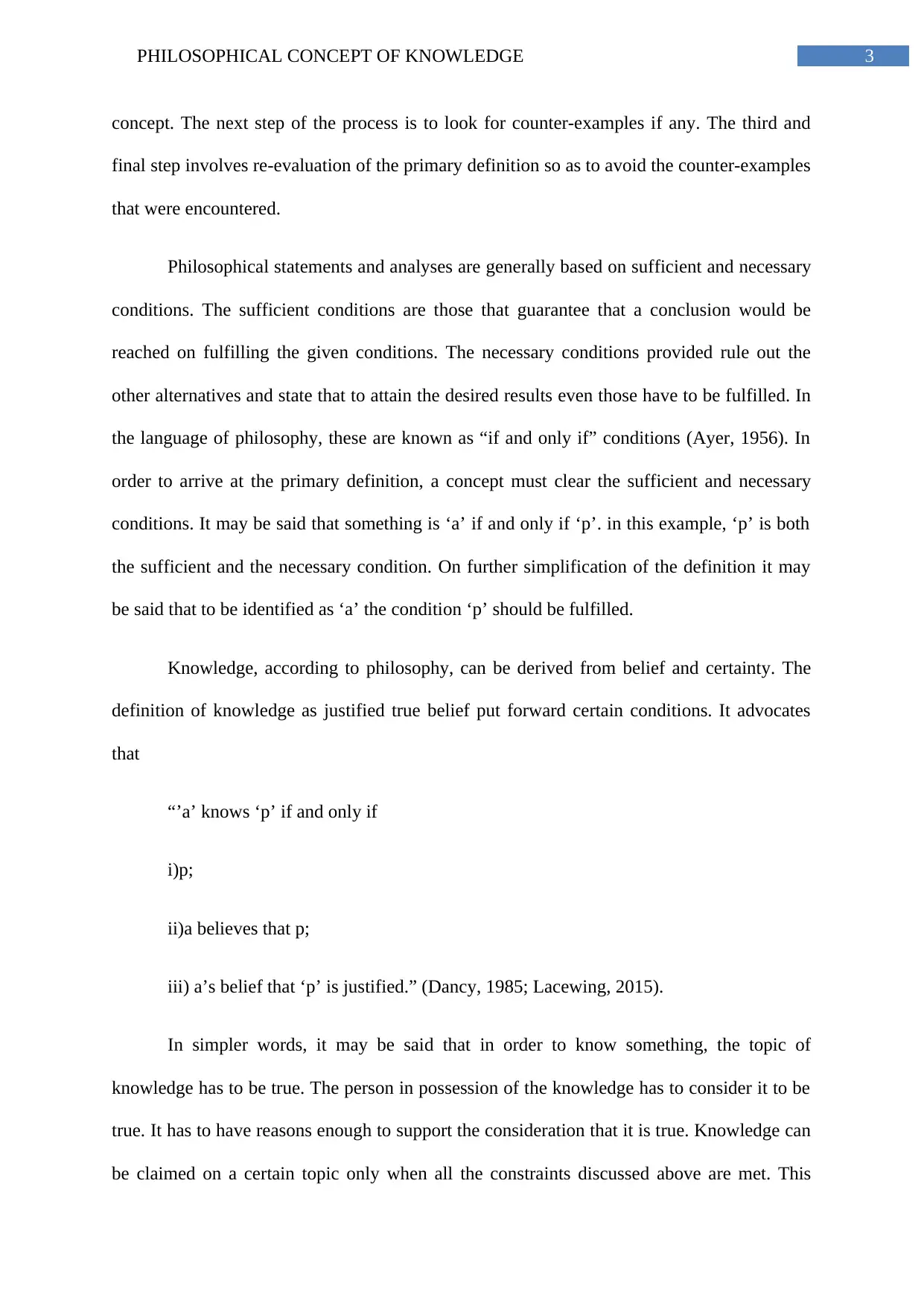
3PHILOSOPHICAL CONCEPT OF KNOWLEDGE
concept. The next step of the process is to look for counter-examples if any. The third and
final step involves re-evaluation of the primary definition so as to avoid the counter-examples
that were encountered.
Philosophical statements and analyses are generally based on sufficient and necessary
conditions. The sufficient conditions are those that guarantee that a conclusion would be
reached on fulfilling the given conditions. The necessary conditions provided rule out the
other alternatives and state that to attain the desired results even those have to be fulfilled. In
the language of philosophy, these are known as “if and only if” conditions (Ayer, 1956). In
order to arrive at the primary definition, a concept must clear the sufficient and necessary
conditions. It may be said that something is ‘a’ if and only if ‘p’. in this example, ‘p’ is both
the sufficient and the necessary condition. On further simplification of the definition it may
be said that to be identified as ‘a’ the condition ‘p’ should be fulfilled.
Knowledge, according to philosophy, can be derived from belief and certainty. The
definition of knowledge as justified true belief put forward certain conditions. It advocates
that
“’a’ knows ‘p’ if and only if
i)p;
ii)a believes that p;
iii) a’s belief that ‘p’ is justified.” (Dancy, 1985; Lacewing, 2015).
In simpler words, it may be said that in order to know something, the topic of
knowledge has to be true. The person in possession of the knowledge has to consider it to be
true. It has to have reasons enough to support the consideration that it is true. Knowledge can
be claimed on a certain topic only when all the constraints discussed above are met. This
concept. The next step of the process is to look for counter-examples if any. The third and
final step involves re-evaluation of the primary definition so as to avoid the counter-examples
that were encountered.
Philosophical statements and analyses are generally based on sufficient and necessary
conditions. The sufficient conditions are those that guarantee that a conclusion would be
reached on fulfilling the given conditions. The necessary conditions provided rule out the
other alternatives and state that to attain the desired results even those have to be fulfilled. In
the language of philosophy, these are known as “if and only if” conditions (Ayer, 1956). In
order to arrive at the primary definition, a concept must clear the sufficient and necessary
conditions. It may be said that something is ‘a’ if and only if ‘p’. in this example, ‘p’ is both
the sufficient and the necessary condition. On further simplification of the definition it may
be said that to be identified as ‘a’ the condition ‘p’ should be fulfilled.
Knowledge, according to philosophy, can be derived from belief and certainty. The
definition of knowledge as justified true belief put forward certain conditions. It advocates
that
“’a’ knows ‘p’ if and only if
i)p;
ii)a believes that p;
iii) a’s belief that ‘p’ is justified.” (Dancy, 1985; Lacewing, 2015).
In simpler words, it may be said that in order to know something, the topic of
knowledge has to be true. The person in possession of the knowledge has to consider it to be
true. It has to have reasons enough to support the consideration that it is true. Knowledge can
be claimed on a certain topic only when all the constraints discussed above are met. This
Paraphrase This Document
Need a fresh take? Get an instant paraphrase of this document with our AI Paraphraser
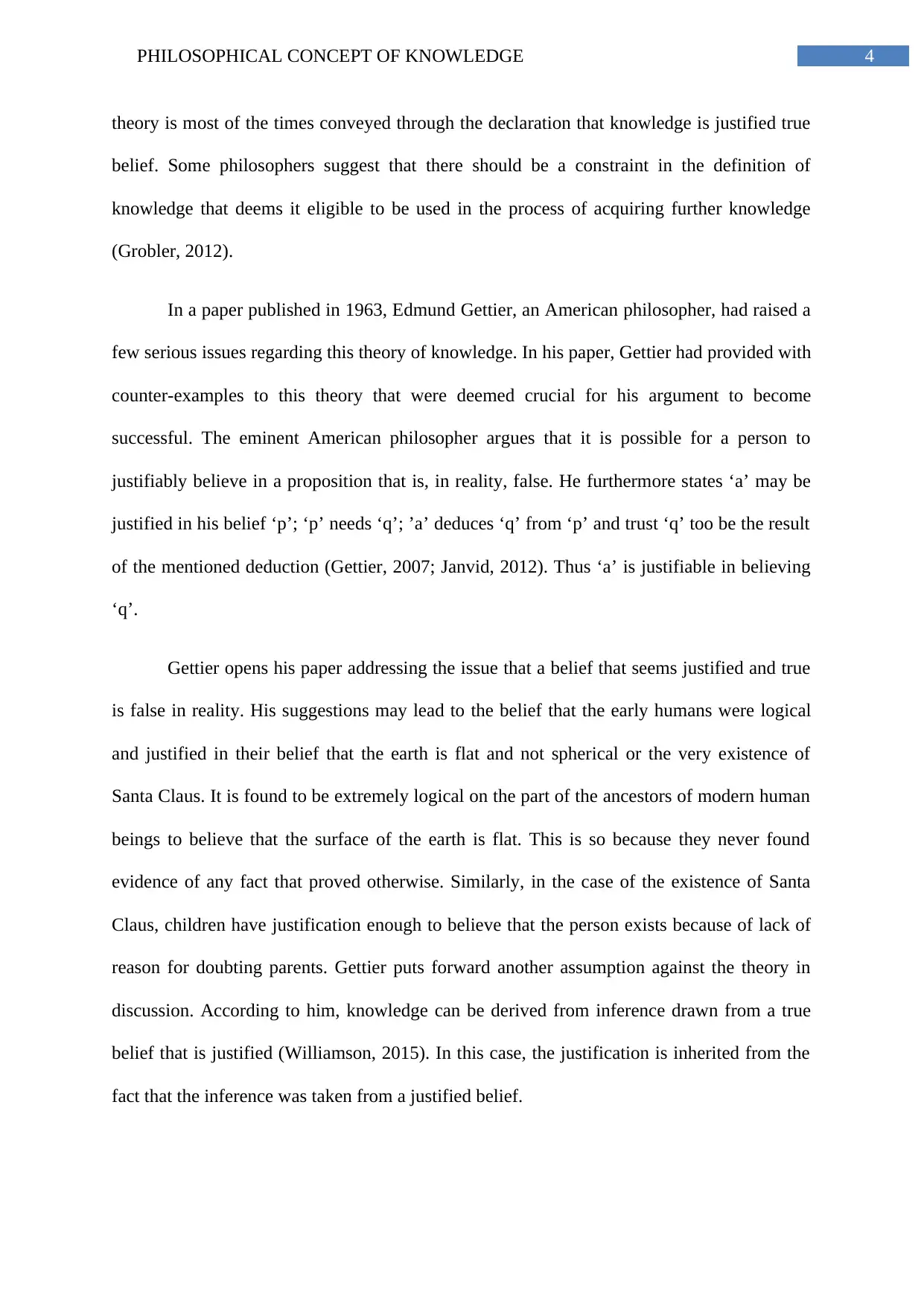
4PHILOSOPHICAL CONCEPT OF KNOWLEDGE
theory is most of the times conveyed through the declaration that knowledge is justified true
belief. Some philosophers suggest that there should be a constraint in the definition of
knowledge that deems it eligible to be used in the process of acquiring further knowledge
(Grobler, 2012).
In a paper published in 1963, Edmund Gettier, an American philosopher, had raised a
few serious issues regarding this theory of knowledge. In his paper, Gettier had provided with
counter-examples to this theory that were deemed crucial for his argument to become
successful. The eminent American philosopher argues that it is possible for a person to
justifiably believe in a proposition that is, in reality, false. He furthermore states ‘a’ may be
justified in his belief ‘p’; ‘p’ needs ‘q’; ’a’ deduces ‘q’ from ‘p’ and trust ‘q’ too be the result
of the mentioned deduction (Gettier, 2007; Janvid, 2012). Thus ‘a’ is justifiable in believing
‘q’.
Gettier opens his paper addressing the issue that a belief that seems justified and true
is false in reality. His suggestions may lead to the belief that the early humans were logical
and justified in their belief that the earth is flat and not spherical or the very existence of
Santa Claus. It is found to be extremely logical on the part of the ancestors of modern human
beings to believe that the surface of the earth is flat. This is so because they never found
evidence of any fact that proved otherwise. Similarly, in the case of the existence of Santa
Claus, children have justification enough to believe that the person exists because of lack of
reason for doubting parents. Gettier puts forward another assumption against the theory in
discussion. According to him, knowledge can be derived from inference drawn from a true
belief that is justified (Williamson, 2015). In this case, the justification is inherited from the
fact that the inference was taken from a justified belief.
theory is most of the times conveyed through the declaration that knowledge is justified true
belief. Some philosophers suggest that there should be a constraint in the definition of
knowledge that deems it eligible to be used in the process of acquiring further knowledge
(Grobler, 2012).
In a paper published in 1963, Edmund Gettier, an American philosopher, had raised a
few serious issues regarding this theory of knowledge. In his paper, Gettier had provided with
counter-examples to this theory that were deemed crucial for his argument to become
successful. The eminent American philosopher argues that it is possible for a person to
justifiably believe in a proposition that is, in reality, false. He furthermore states ‘a’ may be
justified in his belief ‘p’; ‘p’ needs ‘q’; ’a’ deduces ‘q’ from ‘p’ and trust ‘q’ too be the result
of the mentioned deduction (Gettier, 2007; Janvid, 2012). Thus ‘a’ is justifiable in believing
‘q’.
Gettier opens his paper addressing the issue that a belief that seems justified and true
is false in reality. His suggestions may lead to the belief that the early humans were logical
and justified in their belief that the earth is flat and not spherical or the very existence of
Santa Claus. It is found to be extremely logical on the part of the ancestors of modern human
beings to believe that the surface of the earth is flat. This is so because they never found
evidence of any fact that proved otherwise. Similarly, in the case of the existence of Santa
Claus, children have justification enough to believe that the person exists because of lack of
reason for doubting parents. Gettier puts forward another assumption against the theory in
discussion. According to him, knowledge can be derived from inference drawn from a true
belief that is justified (Williamson, 2015). In this case, the justification is inherited from the
fact that the inference was taken from a justified belief.
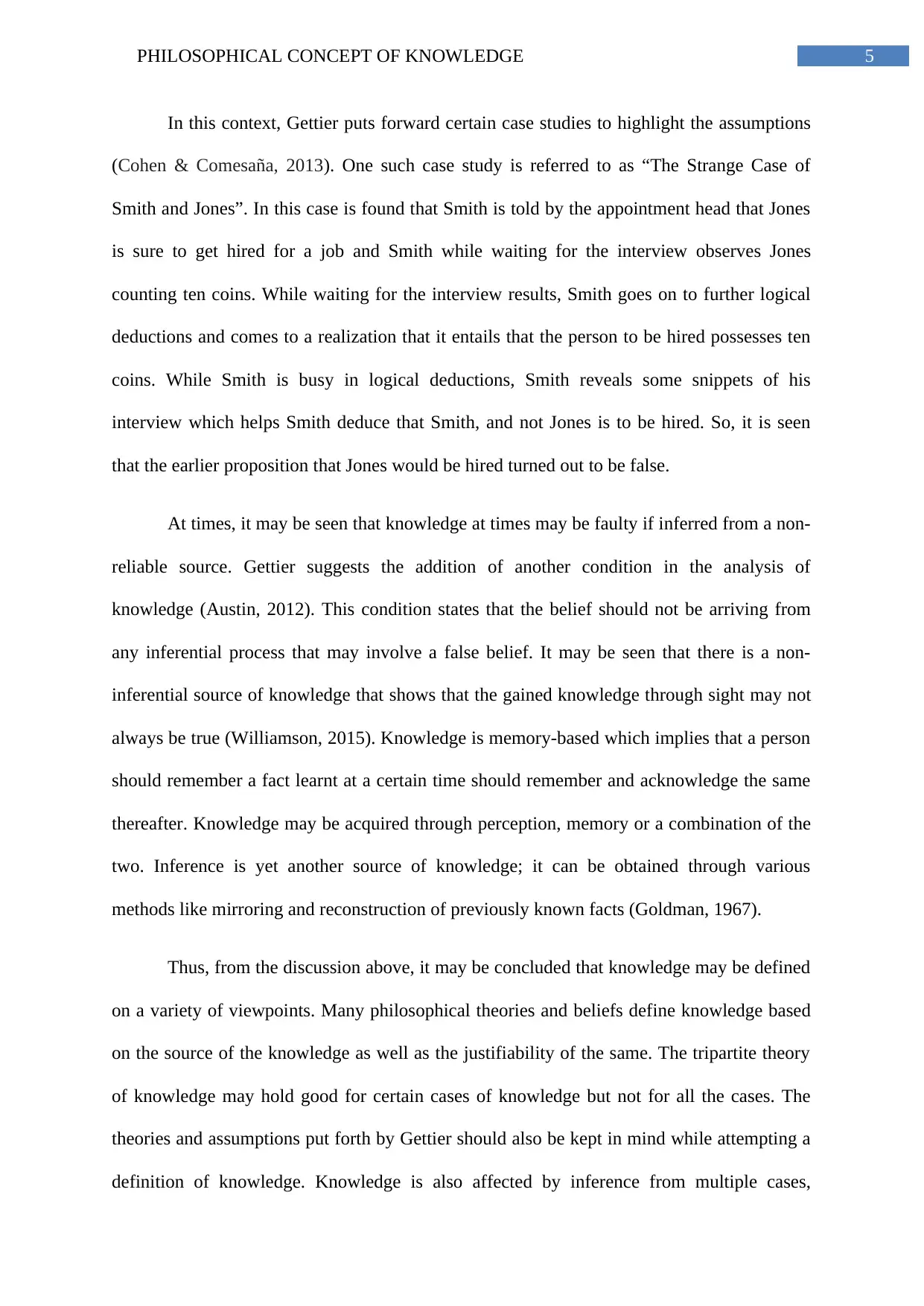
5PHILOSOPHICAL CONCEPT OF KNOWLEDGE
In this context, Gettier puts forward certain case studies to highlight the assumptions
(Cohen & Comesaña, 2013). One such case study is referred to as “The Strange Case of
Smith and Jones”. In this case is found that Smith is told by the appointment head that Jones
is sure to get hired for a job and Smith while waiting for the interview observes Jones
counting ten coins. While waiting for the interview results, Smith goes on to further logical
deductions and comes to a realization that it entails that the person to be hired possesses ten
coins. While Smith is busy in logical deductions, Smith reveals some snippets of his
interview which helps Smith deduce that Smith, and not Jones is to be hired. So, it is seen
that the earlier proposition that Jones would be hired turned out to be false.
At times, it may be seen that knowledge at times may be faulty if inferred from a non-
reliable source. Gettier suggests the addition of another condition in the analysis of
knowledge (Austin, 2012). This condition states that the belief should not be arriving from
any inferential process that may involve a false belief. It may be seen that there is a non-
inferential source of knowledge that shows that the gained knowledge through sight may not
always be true (Williamson, 2015). Knowledge is memory-based which implies that a person
should remember a fact learnt at a certain time should remember and acknowledge the same
thereafter. Knowledge may be acquired through perception, memory or a combination of the
two. Inference is yet another source of knowledge; it can be obtained through various
methods like mirroring and reconstruction of previously known facts (Goldman, 1967).
Thus, from the discussion above, it may be concluded that knowledge may be defined
on a variety of viewpoints. Many philosophical theories and beliefs define knowledge based
on the source of the knowledge as well as the justifiability of the same. The tripartite theory
of knowledge may hold good for certain cases of knowledge but not for all the cases. The
theories and assumptions put forth by Gettier should also be kept in mind while attempting a
definition of knowledge. Knowledge is also affected by inference from multiple cases,
In this context, Gettier puts forward certain case studies to highlight the assumptions
(Cohen & Comesaña, 2013). One such case study is referred to as “The Strange Case of
Smith and Jones”. In this case is found that Smith is told by the appointment head that Jones
is sure to get hired for a job and Smith while waiting for the interview observes Jones
counting ten coins. While waiting for the interview results, Smith goes on to further logical
deductions and comes to a realization that it entails that the person to be hired possesses ten
coins. While Smith is busy in logical deductions, Smith reveals some snippets of his
interview which helps Smith deduce that Smith, and not Jones is to be hired. So, it is seen
that the earlier proposition that Jones would be hired turned out to be false.
At times, it may be seen that knowledge at times may be faulty if inferred from a non-
reliable source. Gettier suggests the addition of another condition in the analysis of
knowledge (Austin, 2012). This condition states that the belief should not be arriving from
any inferential process that may involve a false belief. It may be seen that there is a non-
inferential source of knowledge that shows that the gained knowledge through sight may not
always be true (Williamson, 2015). Knowledge is memory-based which implies that a person
should remember a fact learnt at a certain time should remember and acknowledge the same
thereafter. Knowledge may be acquired through perception, memory or a combination of the
two. Inference is yet another source of knowledge; it can be obtained through various
methods like mirroring and reconstruction of previously known facts (Goldman, 1967).
Thus, from the discussion above, it may be concluded that knowledge may be defined
on a variety of viewpoints. Many philosophical theories and beliefs define knowledge based
on the source of the knowledge as well as the justifiability of the same. The tripartite theory
of knowledge may hold good for certain cases of knowledge but not for all the cases. The
theories and assumptions put forth by Gettier should also be kept in mind while attempting a
definition of knowledge. Knowledge is also affected by inference from multiple cases,
⊘ This is a preview!⊘
Do you want full access?
Subscribe today to unlock all pages.

Trusted by 1+ million students worldwide
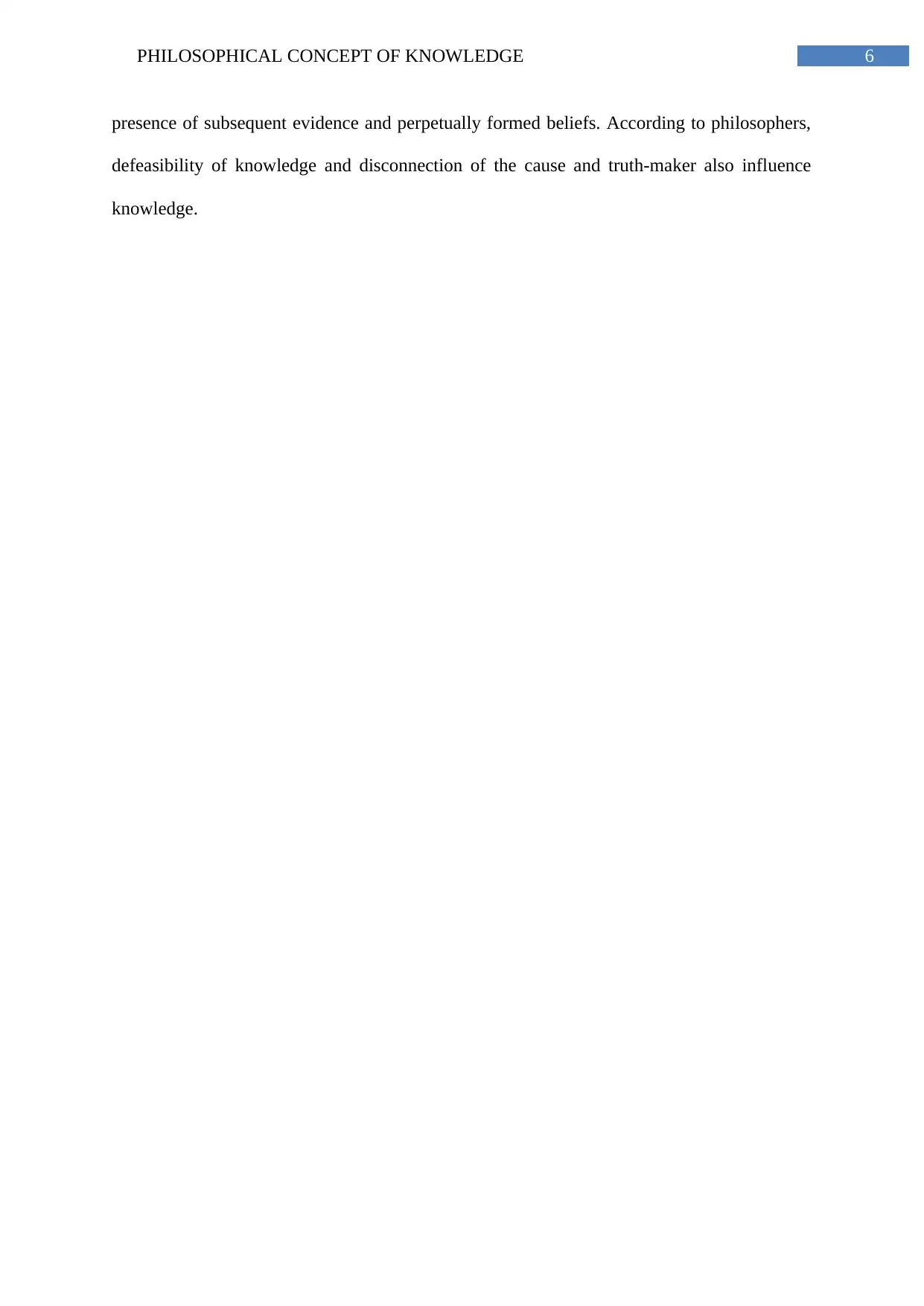
6PHILOSOPHICAL CONCEPT OF KNOWLEDGE
presence of subsequent evidence and perpetually formed beliefs. According to philosophers,
defeasibility of knowledge and disconnection of the cause and truth-maker also influence
knowledge.
presence of subsequent evidence and perpetually formed beliefs. According to philosophers,
defeasibility of knowledge and disconnection of the cause and truth-maker also influence
knowledge.
Paraphrase This Document
Need a fresh take? Get an instant paraphrase of this document with our AI Paraphraser
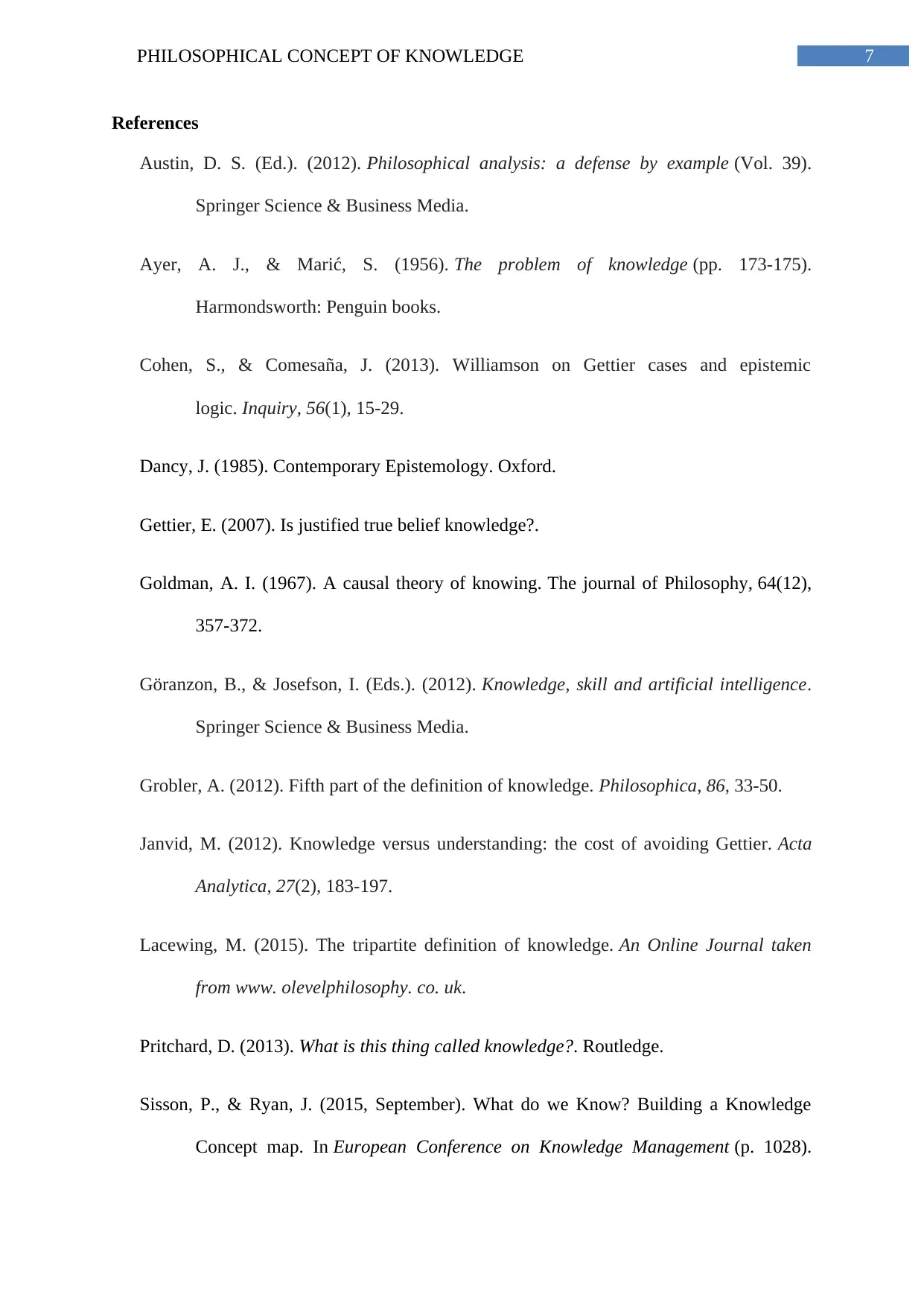
7PHILOSOPHICAL CONCEPT OF KNOWLEDGE
References
Austin, D. S. (Ed.). (2012). Philosophical analysis: a defense by example (Vol. 39).
Springer Science & Business Media.
Ayer, A. J., & Marić, S. (1956). The problem of knowledge (pp. 173-175).
Harmondsworth: Penguin books.
Cohen, S., & Comesaña, J. (2013). Williamson on Gettier cases and epistemic
logic. Inquiry, 56(1), 15-29.
Dancy, J. (1985). Contemporary Epistemology. Oxford.
Gettier, E. (2007). Is justified true belief knowledge?.
Goldman, A. I. (1967). A causal theory of knowing. The journal of Philosophy, 64(12),
357-372.
Göranzon, B., & Josefson, I. (Eds.). (2012). Knowledge, skill and artificial intelligence.
Springer Science & Business Media.
Grobler, A. (2012). Fifth part of the definition of knowledge. Philosophica, 86, 33-50.
Janvid, M. (2012). Knowledge versus understanding: the cost of avoiding Gettier. Acta
Analytica, 27(2), 183-197.
Lacewing, M. (2015). The tripartite definition of knowledge. An Online Journal taken
from www. olevelphilosophy. co. uk.
Pritchard, D. (2013). What is this thing called knowledge?. Routledge.
Sisson, P., & Ryan, J. (2015, September). What do we Know? Building a Knowledge
Concept map. In European Conference on Knowledge Management (p. 1028).
References
Austin, D. S. (Ed.). (2012). Philosophical analysis: a defense by example (Vol. 39).
Springer Science & Business Media.
Ayer, A. J., & Marić, S. (1956). The problem of knowledge (pp. 173-175).
Harmondsworth: Penguin books.
Cohen, S., & Comesaña, J. (2013). Williamson on Gettier cases and epistemic
logic. Inquiry, 56(1), 15-29.
Dancy, J. (1985). Contemporary Epistemology. Oxford.
Gettier, E. (2007). Is justified true belief knowledge?.
Goldman, A. I. (1967). A causal theory of knowing. The journal of Philosophy, 64(12),
357-372.
Göranzon, B., & Josefson, I. (Eds.). (2012). Knowledge, skill and artificial intelligence.
Springer Science & Business Media.
Grobler, A. (2012). Fifth part of the definition of knowledge. Philosophica, 86, 33-50.
Janvid, M. (2012). Knowledge versus understanding: the cost of avoiding Gettier. Acta
Analytica, 27(2), 183-197.
Lacewing, M. (2015). The tripartite definition of knowledge. An Online Journal taken
from www. olevelphilosophy. co. uk.
Pritchard, D. (2013). What is this thing called knowledge?. Routledge.
Sisson, P., & Ryan, J. (2015, September). What do we Know? Building a Knowledge
Concept map. In European Conference on Knowledge Management (p. 1028).
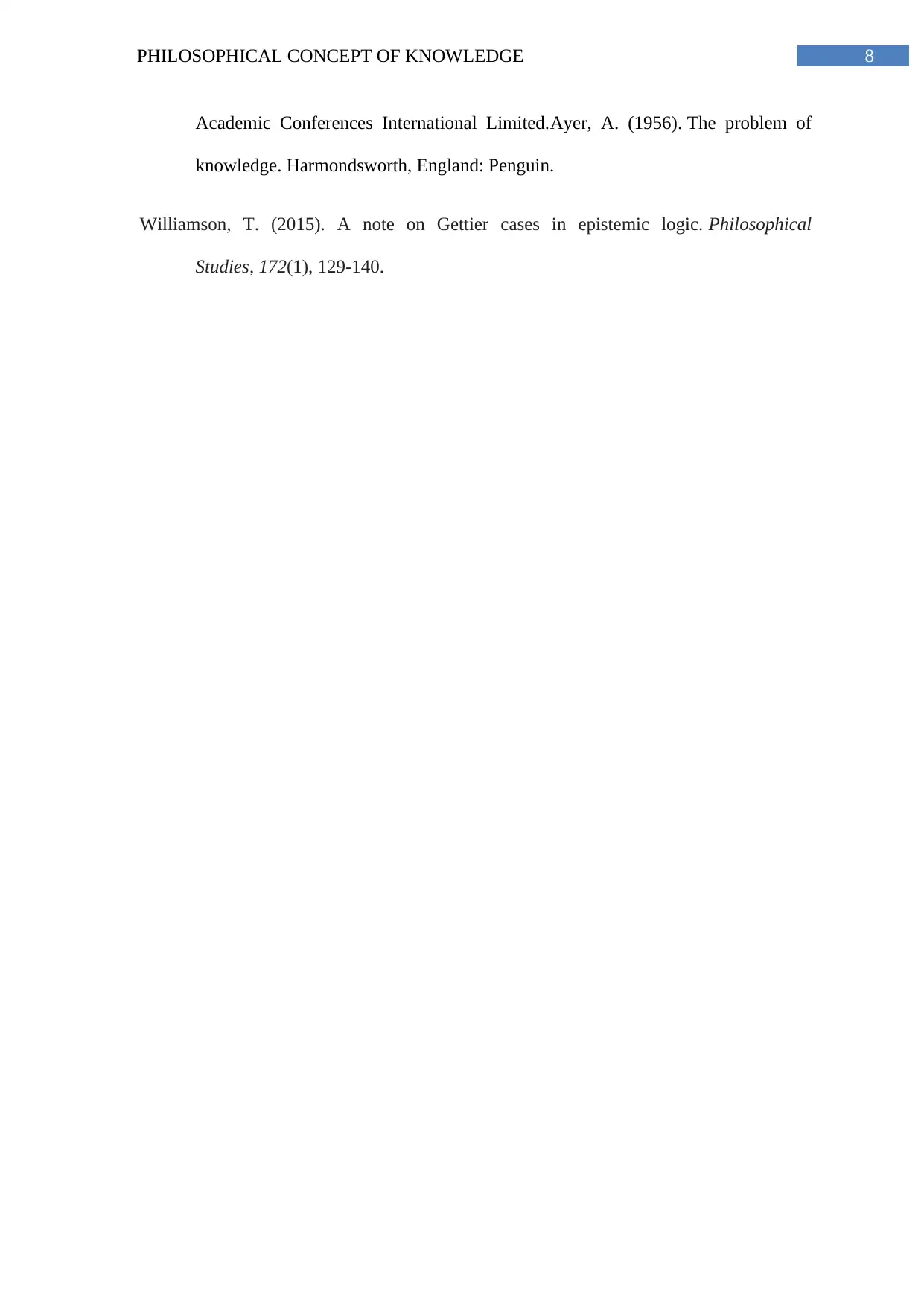
8PHILOSOPHICAL CONCEPT OF KNOWLEDGE
Academic Conferences International Limited.Ayer, A. (1956). The problem of
knowledge. Harmondsworth, England: Penguin.
Williamson, T. (2015). A note on Gettier cases in epistemic logic. Philosophical
Studies, 172(1), 129-140.
Academic Conferences International Limited.Ayer, A. (1956). The problem of
knowledge. Harmondsworth, England: Penguin.
Williamson, T. (2015). A note on Gettier cases in epistemic logic. Philosophical
Studies, 172(1), 129-140.
⊘ This is a preview!⊘
Do you want full access?
Subscribe today to unlock all pages.

Trusted by 1+ million students worldwide
1 out of 9
Related Documents
Your All-in-One AI-Powered Toolkit for Academic Success.
+13062052269
info@desklib.com
Available 24*7 on WhatsApp / Email
![[object Object]](/_next/static/media/star-bottom.7253800d.svg)
Unlock your academic potential
Copyright © 2020–2026 A2Z Services. All Rights Reserved. Developed and managed by ZUCOL.



